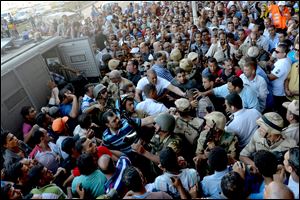
Clashes erupt in Egypt as Islamists stage protests
9/13/2013
Egyptian Army soldiers respond to clashes between supporters and opponents of ousted President Mohammed Morsi in Alexandria, Egypt, today.
CAIRO — Clashes erupted between supporters and opponents of Egypt’s ousted president during nationwide protests today as the military battled al-Qaeda-inspired groups in northern Sinai.
The street rallies came a day after Egypt’s military-backed interim government extended a nationwide state of emergency by two months, citing ongoing security concerns.
Officials said they feared other potential terrorist attacks after a failed assassination attempt targeting Egypt’s interior minister and suicide attacks earlier this week at a military intelligence headquarters and a checkpoint in Sinai that killed six people.
Unrest in Egypt spiked after the popularly backed July 3 military coup that toppled President Mohammed Morsi. The interim government has responded by targeting members of Morsi’s Muslim Brotherhood for arrest and detention.
Many Brotherhood members, like Essam el-Erian, who is wanted on charges of inciting violence and murder, remain on the run.
“We will not give up our rights,” said el-Erian, who urged more protests in a video aired on Al-Jazeera Mubashir Misr, one of the Qatari-based network’s affiliates. “We will not surrender to an oppressive power that only speaks the language of the bullets.”
The security crackdown has impacted the group’s ability to mobilize in the streets to protest Morsi’s ouster. But today, demonstrations appeared to be larger than usual, and several descended into violence.
In the coastal city of Alexandria, hundreds of Brotherhood supporters marched today after prayers from a main mosque to a major thoroughfare, where they confronted a rally by Morsi opponents.
State television showed footage of anti-Morsi protesters tearing down Morsi posters and chasing Brotherhood supporters through the streets.
Authorities said the two sides hurled stones at each other as gunshots rang out. Security forces broke up the melee by firing tear gas and arresting a number of protesters.
In the industrial city of Mahallah, riot police fired tear gas to disperse another Islamist demonstration near a police station, officials said.
Several television crews also came under attack by Morsi supporters. Both Al-Hayat TV and state-run networks said protesters stole their live transmission equipment.
The Brotherhood-led coalition earlier announced a black list of journalists and media personalities it accused of inciting public anger against the group.
Across Egypt, crowds of Morsi supporters raised yellow placards showing an open palm with four raised fingers, a symbol that has come to represent the site of the main pro-Morsi encampment raided by security forces on Aug. 14, sparking violence that left hundreds dead and thousands wounded.
Some demonstrators carried pictures of the slain protesters while chanting, “It is a military coup.”
“After all the massacres and after seeing people die in front of my eyes, you have to take to the streets,” said 28-year-old Haitham Mohammed, who joined a protest in eastern Cairo’s Nasr City. He said he lost three of his friends in the dismantling of the protest camp.
Some Cairo residents watching the protests blamed the demonstrators for Egypt’s economic downturn and the security woes plaguing the country.
“The state should respond strongly against those protests because they are slowing down the economy,” said Ali Abdel-Karim, a resident of Cairo’s Dokki neighborhood. “If I were a state official, I would just kill them all.”
Meanwhile, in the Sinai, helicopter gunships targeted suspected Islamic militant hideouts in villages south of the town of Sheikh Zuweyid and farmlands near the city of el-Arish at sunrise, said a military official, who spoke on condition of anonymity because he was not authorized to speak to journalists.
Sheik Hassan Khalaf, who lives in a village five kilometers (three miles) from the targeted areas, said he saw smoke billowing after hearing loud explosions starting at 5 a.m.
“I think the suicide attacks are a desperate attempt to repel a military assault,” Khalaf said by telephone. “As a resident here, I hope the military never stops until they are all out of here.”
Earlier, tribesmen expressed anger over two elders being accidentally shot and the military demolishing homes in the midst of the fighting.
“Those Takfiris are hiding in the middle of residential areas. It’s a war and it is very possible that people get shot in the middle,” Khalaf said, referring to extremists who reject anyone who doesn’t follow their strict interpretation of Islam as heretics.
Today's attack was part of an offensive launched last week by the Egyptian military in the Sinai, following militant attacks that have killed more than 70 police officers and soldiers. In the worst single attack, gunmen pulled police recruits from buses and shot 25 of them dead on Aug. 19.
A total of 29 militants were killed in a three-day military offensive that began Sept. 7. Officials did not immediately offer casualty figures for today's offensive.
Meanwhile, a group called Jund al-Islam claimed responsibility for the suicide bombings Wednesday that targeted a military building and a checkpoint in the town of Rafah bordering the Gaza Strip, killing six people.
The statement posted on Islamic websites late Thursday appeared identical to an earlier one by another Sinai-based group, Ansar Jerusalem, which claimed responsibility for the failed assassination attempt on Egypt’s Interior Minister Mohammed Ibrahim last week. That attack, in the heart of Cairo, killed one person and wounded more than 20. The minister escaped unharmed.